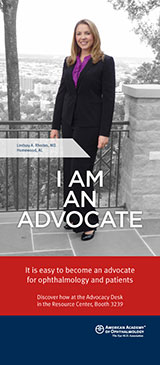 I admit it: Deep down I am a patriot. When I worked in a U.S. senator’s office before my medical career, I loved seeing groups of school kids come through the office to learn about our unique political system. On Election Day, I am excited to make my voice heard and to see lines of fellow citizens at the polls, standing up for their beliefs. Now, as an ophthalmologist, I am proud to advocate on behalf of my patients and my profession.
I admit it: Deep down I am a patriot. When I worked in a U.S. senator’s office before my medical career, I loved seeing groups of school kids come through the office to learn about our unique political system. On Election Day, I am excited to make my voice heard and to see lines of fellow citizens at the polls, standing up for their beliefs. Now, as an ophthalmologist, I am proud to advocate on behalf of my patients and my profession.
I work to advocate for my field in numerous ways. First and foremost, I am a member of my state society, as every ophthalmologist should be. The state society is your tool to know what is happening in your state’s government, insurance carriers, licensing and reimbursement. Secondly, I donate yearly to my state society PAC, OPHTHPAC and the Surgical Scope Fund. Granted, I just completed my training, so my donations are not large at this time, but they are a regular and growing part of how I make my voice heard. Next, I attend the Mid-Year Forum in Washington, D.C. each spring. This is a great venue to learn about how the American Academy of Ophthalmology works tirelessly every single day to keep current on the issues in Congress that affect us all. It’s also a lot of fun to walk all over the Hill and visit our U.S. congressmen and U.S. senators.
There are many other ways to advocate for ophthalmology. When important issues require immediate action by ophthalmologists, the Academy sends emails with a link to send a drafted letter to your congressman. This takes minutes to do and makes a great impact as members of Congress really do listen to what their constituents have to say. Another great way to advocate for our field is to invite local and state legislators to your office or operating room so that they can see first-hand how an ophthalmologist cares for a person’s sight. In Alabama, we organized a half-day tour of our academic facility for a group of state senators on the health committee. We led them on a tour of our eye emergency room, eye operating rooms and clinics. They watched footage of a cataract surgery performed by one of our residents and were amazed at the procedure. The legislators met Alabama patients who could return to work and resume productive lives after having dense cataracts removed.
While helping individual patients improve their vision each day is fulfilling, I feel even more satisfied knowing that I can do small, simple things to advocate for an even larger group of patients and my profession. I encourage all ophthalmologists to tap into their patriotism and try being an advocate.
Lindsay A. Rhodes, MD, is an assistant professor of ophthalmology at the University of Alabama at Birmingham.